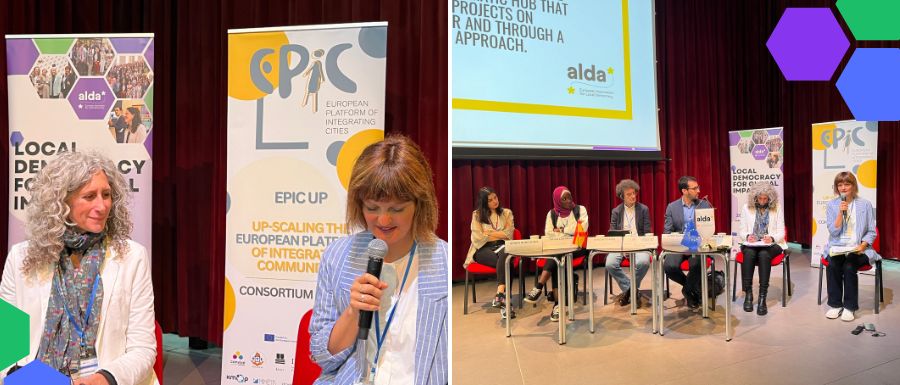On May 14, a pivotal policy session on migration titled “Changing Communities: The Role of Local Authorities in Addressing the Migration Phenomena” was held as part of the General Assembly and Festival 2024. ALDA convened key stakeholders to unveil its Flagship Migration Strategy for 2024-2028. The session underscored the essential role local authorities play in managing migration challenges, promoting integration, and advocating for migrants’ rights.
The session commenced with a presentation of ALDA’s new migration strategy, which highlighted two primary initiatives: Coordinated Actions for Migrants’ Rights and Community Integration Advocacy.
This strategy calls upon ALDA’s members and networks to unite in enhancing and safeguarding the rights of migrants, shaping EU policies, and fostering inclusive environments
Mr. André Sobczak, Secretary General of Eurocities, shared insights into how cities, at the forefront of EU policy implementation, ensure the inclusion of migrants and coordinate efforts to tackle migration challenges. He emphasised the crucial role cities play in transforming communities through effective migrant inclusion strategies.
Following this, Mr. Vincent Gatel, Deputy Mayor of the Welcoming City, elaborated on strategies and policies adopted by local authorities in alignment with the National Association of Welcoming Cities and Territories. These strategies aim to create inclusive environments for migrants, fostering cohesive communities amidst evolving migration dynamics.
Mrs. Raisa Labaran, Municipal Councillor of the Municipality of Brescia (Italy), discussed specific initiatives and policies implemented to integrate migrants into the community and safeguard their rights. Brescia’s efforts serve as a model for other municipalities aiming to foster inclusive environments, highlighting the importance of local-level initiatives in migration policy.
Ms. Lupe Moreno, Deputy Director General of Migration, Refugee, and Antiracism, emphasised the importance of collaboration between regional and local authorities. She highlighted how these efforts address migration challenges and promote inclusive communities, aligning with Catalonia’s political priorities. One of the initiatives, in which the Government of Catalonia participates, is the European project EU-Belong. Funded by AMIF and led by the Assembly of European Regions, this project aims to build capacity and co-design intercultural integration strategies with local stakeholders. Additionally, Mr. Jordi Cuadras, President of Fons Català de Cooperació al Desenvolupament, presented initiatives focusing on social cohesion and inclusion, showcasing successful integration efforts at the local level.
Mrs. Şener Burcuhan, Director of International Affairs for the Marmara Municipalities Union (MMU), shared insights on the Migration Policy Center’s role in providing a collaborative platform for stakeholders in the region. This platform addresses migration challenges and promotes social cohesion and urban belonging in the Marmara Region, underscoring the importance of coordinated networks in migration policy.
Mr. Roberto Venneri, General Secretary of the Region of Puglia (Italy), elaborated on the region’s approach to prioritising social cohesion and inclusion in addressing migration challenges. He highlighted various successful initiatives supporting migrant integration through EU-funded projects, demonstrating Puglia’s proactive stance on migration issues.
The panel concluded with a consensus on the importance of collaborative efforts and the sharing of best practices in addressing migration challenges and promoting migrant integration. The diverse approaches and successful initiatives presented underscored the critical role of coordinated actions at all levels of governance. This collective effort aims to create supportive and inclusive environments for migrants, ensuring their rights and facilitating their active participation in the community.
The launch of ALDA’s Flagship Migration Strategy 2024-2028 represents a significant step towards a more inclusive and cohesive Europe, where local authorities are pivotal in transforming communities and addressing migration phenomena.
